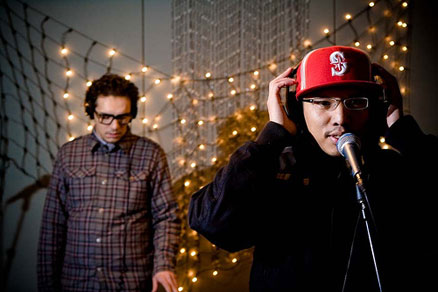Written by Chrisline Camille Rose Raymundo
“I heard a few heads say that hip-hop was dead, no it’s not
It’s just malnourished and underfed”
– from Blue Scholars’ “Southside Revival”
Personally, I do not listen to a lot of hip-hop and I have never been astonished and excited about it until I recently listened to Blue Scholars’ whole album, Cinemetropolis.
Iranian American DJ/producer Sabzi (Alexei Saba Mohajerjasbi) and Filipino American rapper Geologic (George Quibuyen) formed the independent Seattle-based group in college in 2002. Their music mostly focuses on race issues, liberal politics, and the positive effects of marijuana. Thus, they have been using their music to educate people and advocate social change. They comment on mainstream hip-hop culture, saying that it’s not dead and instead if “malnourished and underfed.”
(Photo Courtesy of Blue Scholars Official Website)
At the Empire of Funk conference held at University of California, Irvine, on May 23, 2014, Geologc, also know as Prometheus Brown, expressed this notion that everywhere he settled, Hawaii and Seattle, was home to him, not just the Philippines, and that this served as a “driving force in his art”. He said, “It wasn’t until high school that I started to work with the Filipino Community… I was always in contact with different ethnicities.” Hip-hop has always been deeply involved in his life especially since people from other communities who were also hip-hop artists.
Hip-hop opened up Geologic, who was once a timid child of Filipino immigrants [1]. It helped him defy the minority myth and made him not afraid to speak out his mind.
In Andrew Matson and Ann Powers’ interview with Blue Scholars on National Public Radio, Sabzi said, “You can’t assume that a person’s ethnicity makes them privy to a certain taste in sound. It has more to do with your region, your culture. People are like, ‘Oh is it because you’re Persian that you have rhythm?’ It’s like, ‘No! It’s ’cause I grew up on the West Coast in the ’80s and ’90s.” [2]
Location and its culture has always inspired Blue Scholars. This is demonstrated in many of their songs, such as “The Ave”, which is named after a street near the University of Washington, the college that Blue Scholars attended. The Ave wasn’t just a place for people to socialize, but also an environment to discuss societal issues that were directly related to Seattle.
(Photo Courtesy of Christopher Nelson)
Geologic doesn’t just focus on issues that are present in the United States, but also in the Philippines. He joined the Stop the Killings Tour with rapper Kwela and Koba [3]. There were many political killings in the Philippines, which were authorized under the Arroyo regime and Geologic wanted people to be more aware of what was going on there and take action.
Their most recent album, Cinemetropolis, particularly shows the connection between society and media. In “Oskar Barnack ∞ Oscar Grant”, Sabzi creatively uses camera clicks as beats to represent Oskar Barnack, who constructed the 35 mm camera. Then, Geologic raps,
“Shoot the cops, shoot the cops, shoot the cops
Take your cameras out your pockets people”
to represent the police shooting of Oscar Grant at Fruitvale Station, an event which many people took pictures and videos of with their phones and cameras.
Geologic and Sabzi also have ongoing projects with other artists, such as RA Scion and Bambu, so check those out!
References:
[1]
[2] http://www.npr.org/blogs/therecord/2011/07/01/137537350/grind-and-shine-blue-scholars
[3] http://www.iacenter.org/archive-2007/philippnes_stopkillingstour0307.html


